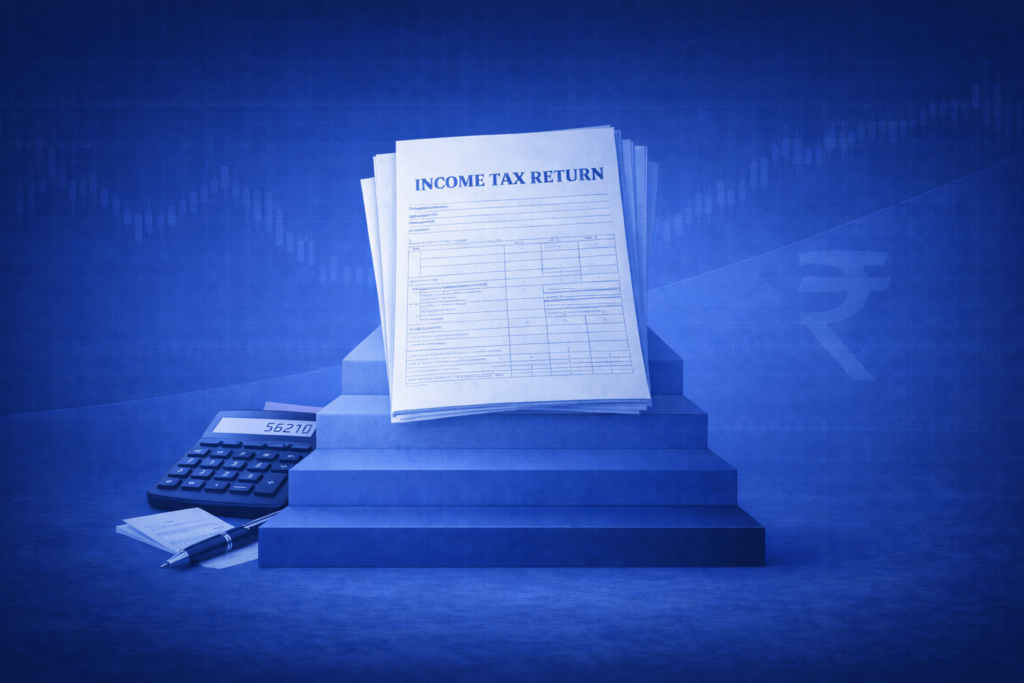When you sell an asset like real estate, stocks, or gold and make a profit, you are required to pay capital gains tax. In India, this tax is charged in the year the transfer takes place. Capital gains are divided into short-term and long-term based on how long you held the asset before selling.
The government imposes this tax to ensure that profits from investments contribute to the nation’s revenue pool, just like regular income. In this blog, we’ll cover capital gains tax, the different types of gains, and how to calculate them. Read along!
Types of Capital Gains
When you sell a capital asset and profit from it, the tax you pay depends on how long you held the asset. There are two types:
Short-Term Capital Gains (STCG)
You make short-term gains when you sell a capital asset within a short holding period:
- For real estate and other assets (like gold, debt funds, jewellery): Sold within 24 months of purchase.
- For listed equity shares and mutual funds: Sold within 12 months of purchase.
Important: For debt mutual funds, market-linked debentures, and unlisted bonds acquired after 1st April 2023, gains are always considered short-term, even if you hold them for longer.
Long-Term Capital Gains (LTCG)
Long-term capital gains occur when you sell a capital asset after holding it for a longer duration:
- For real estate and other assets: Held for more than 24 months.
- For listed equity shares and mutual funds: Held for more than 12 months.
Special Cases:
- The previous owner’s holding period is also considered if an asset is received as a gift, inheritance, or through a will.
- For bonus or rights shares, the holding period starts from the date of allotment.
What is the Capital Gains Tax Rate in India
Capital gains are taxed differently depending on the type of gain and when the transfer occurs. Let’s break this down.
Current Tax Rates for STCG and LTCG
The tax rates before 23rd July 2024 were:
- STCG on listed equity shares or equity mutual funds (STT paid): Taxed at 15%.
- STCG on other assets: Taxed as per your income tax slab.
- LTCG on listed equity shares and equity mutual funds (beyond ₹1 lakh gain): Taxed at 10% without indexation.
- LTCG on real estate, gold, debt funds, and others: Taxed at 20% with indexation.
However, the tax rates from 23rd July 2024 are:
- STCG on listed equity shares and equity mutual funds: Taxed at 20%.
- STCG on other assets: Taxed as per the income tax slab.
- LTCG on listed equity shares and equity mutual funds (beyond ₹1.25 lakh gain): Taxed at 12.5% without indexation.
- LTCG on real estate:
- Individuals and HUFS can choose between 12.5% without indexation and 20% with indexation.
- Other taxpayers: 12.5% without indexation.
Holding Period Criteria
| Asset Type | Short-Term | Long-Term |
| Listed equity shares, equity mutual funds | ≤ 12 months | > 12 months |
| Real estate, gold, debt mutual funds, and other assets | ≤ 24 months (property) or ≤ 36 months (others) | > 24 or 36 months, depending on the asset |
Note: For debt mutual funds bought after 1st April 2023, gains are always short-term, taxed as per slab rates, regardless of how long you hold them.
Capital Gains Tax on Different Asset Classes
Capital gains tax in India depends on two main factors: the type of asset you are selling and how long you have held it. Let’s break it down clearly:
| Asset Class | Holding Period for Long-Term | Short-Term Tax Rate | Long-Term Tax Rate |
| Equity Shares & Equity Mutual Funds | More than 12 months | 15% | 12.5% on gains above ₹1.25 lakh |
| Real Estate | More than 24 months | 30% (added to income slab) | 20% with indexation (before 23 July 2024) or 12.5% without indexation (after 23 July 2024) |
| Gold | More than 24 months | 30% (added to income slab) | 20% with indexation or 12.5% (depending on sale date) |
| Debt Mutual Funds & Other Assets | Always short-term if acquired after 1 April 2023 | Taxed at income slab rates | No separate long-term rate if bought after 1 April 2023 |
How to Calculate Capital Gains Tax
Understanding how to calculate your capital gains correctly helps you avoid incorrect tax payments. Here’s how you can do it:
Basic Calculation Formula
- Short-Term Capital Gain (STCG):
Sale Price – Transfer Expenses – Purchase Cost – Improvement Cost - Long-Term Capital Gain (LTCG):
Sale Price – Transfer Expenses – Indexed Cost of Acquisition – Indexed Cost of Improvement
Indexed Cost of Acquisition
When you sell a long-term asset, such as property or gold, you adjust the purchase price for inflation. Formula for Indexed Cost =
Original Purchase Price × (Cost Inflation Index in Sale Year ÷ Cost Inflation Index in Purchase Year)
This inflation adjustment reduces your taxable capital gain, helping you pay lower taxes.
Exemptions and Deductions on Capital Gains
Capital gains tax can be heavy on your finances. Still, the Income Tax Act offers several exemptions that can help you reduce or even eliminate this burden if you meet specific conditions. Here’s a clear look at the major sections you should know.
Section 54: Sale of Residential House Property
If you sell a residential house and earn long-term capital gains, you can claim an exemption by:
- Buying one or two residential houses within India.
- If investing in two houses, the capital gains must not exceed ₹2 crore (allowed only once in a lifetime).
- If investing in one house, no such limit applies.
- Timelines:
- Purchase the new house within 1 year before or 2 years after the sale.
- Or complete construction within 3 years after the sale.
- Important: The exemption will be withdrawn if you sell the new property within 3 years.
Note: The Maximum exemption limit is capped at ₹10 crore after recent changes.
Section 54F: Sale of Assets Other Than Residential Property
If you sell any other long-term capital asset (like land, gold, or commercial property):
- You must invest the entire sale consideration, not just the gain, into buying or constructing a residential house in India.
- Timelines: Same as Section 54 (1 year before or 2 years after purchase; 3 years for construction).
- Partial Investment: If only part of the sale proceeds is invested, the exemption is allowed in proportion to the amount invested.
Section 54EC: Reinvestment in Specified Bonds
If you sell a house or land and do not want to buy another property:
- You can invest up to ₹50 lakh in bonds issued by NHAI, REC, PFC, or IRFC.
- Investment must be made within 6 months of the sale date.
Lock-in Period: The bonds must be held for 5 years. You cannot sell them before that.
Other Useful Exemptions
- Section 54B: Available if you sell agricultural land used for farming for at least 2 years before sale and buy another agricultural land within 2 years.
- Section 54D: Available on the sale of land or a building used for an industrial undertaking, if you invest in another industrial property within 3 years.
Capital Gains Account Scheme (CGAS)
If you have not yet finalised a new property purchase or investment before filing your income tax return:
- You can deposit the capital gains in a special Capital Gains Account in a public sector bank.
- This allows you to claim the exemption now and use the funds later within the allowed timelines.
If you fail to use the deposited money within the required period, the unutilised amount will be taxed as capital gains in the year the timeline expires.
Deductible Expenses When Calculating Capital Gains
You can deduct the following expenses from the sale price to reduce your taxable capital gain:
- Sale of property: Brokerage fees, stamp duty, and legal costs related to the transfer.
- Sale of shares: Broker commission (but not Securities Transaction Tax).
- Sale of jewellery: Broker’s commission is used to find the buyer.
Note: These expenses can be claimed only once and cannot be claimed under any other section.
Filing and Reporting Capital Gains Tax
Accurately reporting capital gains is important to avoid penalties and unnecessary scrutiny. Here’s a clear guide to help you file your capital gains in your Income Tax Return (ITR) the right way.
How to Disclose Capital Gains in ITR
- Choose the Correct ITR Form: If your income includes capital gains but no business income, you should file ITR-2. If you have income from a business or profession along with capital gains, use ITR-3.
- Report on the Right Schedule: Fill in the details under ‘Schedule Capital Gains’ after selecting your form. You must separately report short-term and long-term gains. You may also need to fill out Schedule 112A for listed shares and mutual funds.
- Provide Full Sale and Purchase details, including important information such as sale price, purchase cost, date of acquisition, date of sale, and ISIN (International Securities Identification Number), where applicable.
- Calculate Gains Correctly: For long-term assets, apply indexation wherever allowed. Ensure you calculate gains according to the latest tax rates applicable for the financial year.
- Pay Any Tax Dues Before Filing: If your capital gains result in extra tax payable, clear the dues before submitting your return to avoid interest charges.
- Verify and Submit: After filing, you must verify the return within 30 days through Aadhaar OTP, net banking, or by sending a signed ITR-V to the Income Tax Department.
Important Documents and Schedules
To correctly file your capital gains, keep the following ready:
- Sale and Purchase Deeds (for property sales)
- Broker Statements or Capital Gains Report (for shares and mutual funds)
- Form 26AS and AIS/TIS Statement (tax credit and income summary)
- Proof of Expenses (brokerage, stamp duty, legal fees, if any)
- Exemption Proofs (investment proofs under Sections 54, 54EC, or 54F if you are claiming tax exemptions)
Relevant schedules you will use in the ITR forms include:
- Schedule Capital Gains (for all types of assets)
- Schedule 112A (for listed equity shares and equity-oriented funds)
- Part B – TTI (Tax Computation) (for final tax payable)
Common Mistakes and Tips
When it comes to calculating capital gains and planning for taxes, even small mistakes can lead to unnecessary tax payments or notices from the tax department. Here’s what you need to watch out for — and how you can plan better.
Mistakes Investors Make While Calculating Gains
- Ignoring Indexed Cost for Long-Term Assets: Many people forget to apply indexation (an adjustment for inflation) when calculating long-term capital gains on real estate, debt funds, and other assets. This can inflate your taxable gains unnecessarily.
- Using the Wrong Holding Period: Different assets have different holding period rules. For example, equity shares are long-term after 12 months, while real estate is long-term after 24 months. Using the wrong period can result in incorrect tax rates.
- Not Including Transfer Expenses: Expenses such as brokerage fees, stamp duty, and legal charges are deductible from the sale price but are often overlooked when calculating capital gains.
- Confusing Sale Price and Sale Consideration: Some investors incorrectly use the full sale price instead of deducting allowable expenses to arrive at the net sale consideration.
- Missing Out on Reinvestment Deadlines: If you want to claim exemptions under Sections 54, 54F, or 54EC, you must reinvest the gains within specific timelines. Missing these windows can cost you your exemptions.
- Not Using the Capital Gains Account Scheme: If you cannot reinvest immediately but plan to do so, deposit the amount in a capital gains account before the due date for filing returns. Skipping this step results in taxable gains.
Tips for Efficient Tax Planning
- Plan Your Sale Strategically: If your investment nears the long-term holding period, consider waiting to sell to benefit from lower tax rates.
- Use Indexation Wherever Allowed: For assets like property and debt mutual funds, apply indexation to reduce your taxable gains and pay lower taxes.
- Document every expense: Keep records of brokerage, stamp duty, legal costs, and any other transfer-related expenses. These help reduce your capital gain amount legitimately.
- Choose the Right Reinvestment Option: Decide early whether you want to reinvest in property (Section 54/54F) or bonds (Section 54EC) so that you don’t miss deadlines.
- Diversify Your Capital Gains Investments: If you sell multiple assets in a single year, plan the sales so that your total taxable income remains in a lower tax slab whenever possible.
- Review Changes Annually: Stay up to date with budget announcements. For instance, changes introduced in 2024 affected rates for both short-term capital gains (STCG) and long-term capital gains (LTCG).
FAQs
What is capital gains tax, and when is it applicable?
Capital gains tax is the tax you pay on the profit earned from selling a capital asset like stocks, real estate, or gold. It becomes applicable in the year you sell or transfer the asset, not when you originally bought it.
What is the capital gains tax on stocks and property?
For stocks and equity mutual funds, the capital gains tax rate is:
- Short-term gains (holding period of 1 year or less) are taxed at 15%.
- Long-term gains (holding period > 1 year) are taxed at 12.5% if gains exceed ₹1.25 lakh.
For property, the capital gains tax rate is:
- Long-term gains are taxed at 20% with indexation if they are sold before July 23, 2024.
- For sales made after July 23, 2024, you can choose between 12.5% without indexation or 20% with indexation.
What is the capital gains tax rate for long-term investments?
For long-term investments:
- Listed shares and equity mutual funds: 12.5% (without indexation) beyond ₹1.25 lakh of gains.
- Real estate and other assets: 20% with indexation, or 12.5% without indexation (if sold after 23rd July 2024).
How can I save tax on capital gains in India?
You can save tax on capital gains by reinvesting the gains under specific sections:
- Section 54: Buying a new residential house property.
- Section 54EC: Investing in specified bonds (like NHAI, REC) within six months of sale.
- Section 54B: Reinvesting sale proceeds from agricultural land into new agricultural land.
You must meet certain conditions and timelines to claim these exemptions.
What is the difference between short-term and long-term capital gains?
The difference lies in the holding period:
- Short-term capital gains (STCG): If you sell the asset within one year of purchase (for stocks and equity mutual funds) or within three years for other assets like real estate.
- Long-term capital gains (LTCG): If you hold the asset for more than one year (for stocks and equity mutual funds) or more than three years for other assets.























